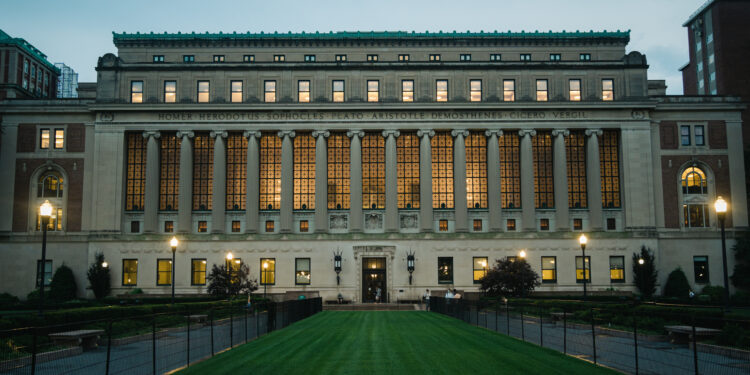On Wednesday, September 4th, the start of the new academic term at Columbia University in New York was marked by renewed protests and heightened security, as tensions over the ongoing conflict in Gaza spilled onto the campus. The NYPD arrested several protesters at a pro-Palestine demonstration held just outside the university’s gates. The protesters, many covering their faces with traditional keffiyeh scarves, chanted “Free Palestine” and carried banners condemning Israel’s military actions in Gaza.
The protest followed a series of similar demonstrations last year, which culminated in a police raid on a pro-Palestinian encampment within the university grounds. This raid led to over 100 arrests and widespread controversy, prompting the resignation of the then-university president, Minouche Shafik. On Tuesday, protesters made their presence felt by dousing the Alma Mater statue with red paint, symbolizing the bloodshed in Gaza. The incident occurred around noon, causing temporary disruption as authorities moved quickly to clean the area.
Despite the arrests and confrontations, police described the day’s events as “peaceful.” However, the protests have sparked a polarized response among the student body and faculty. Some students expressed their support for the demonstrations, viewing them as a vital part of the university’s culture of free speech and activism. “I’m interested in becoming more educated,” said Rachel Black, a freshman from North Carolina, reflecting a sentiment shared by many of her peers.
On the other hand, Jewish students like David Lederer voiced concerns about rising antisemitism on campus, criticizing the lack of condemnation from pro-Palestinian groups regarding the October 7, 2023, Hamas attack on Israel, which resulted in significant casualties. “To be anti-war is one thing, but to be pro a terrorist organization is another,” Lederer stated during a small counter-protest, highlighting the divisions within the campus community.
Columbia University, in a statement, emphasized its commitment to maintaining a safe and respectful environment for all students. The administration did not directly address the protests but reiterated its focus on advancing knowledge and fostering a diverse academic community.
As the academic year unfolds, both pro-Palestinian and pro-Israeli groups at Columbia are expected to continue their activism, reflecting broader international tensions. With the university under the spotlight, these protests may influence discussions about free speech, security, and the role of educational institutions in political discourse.









